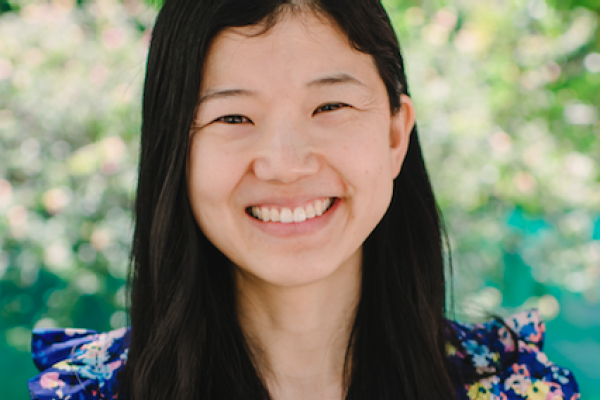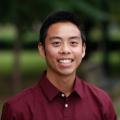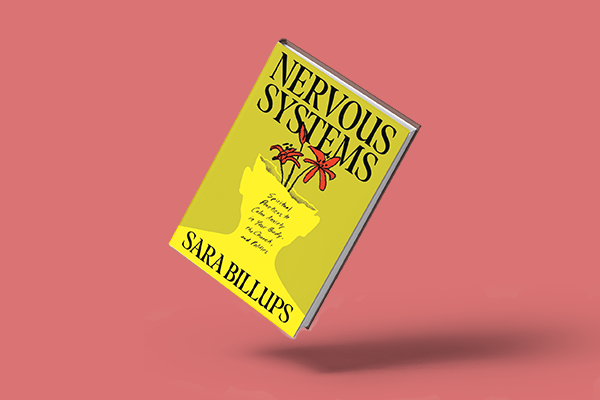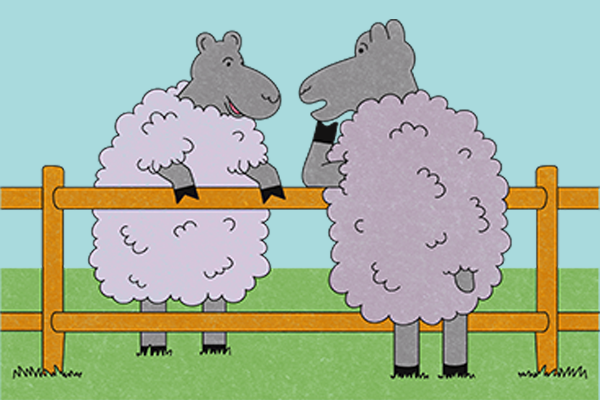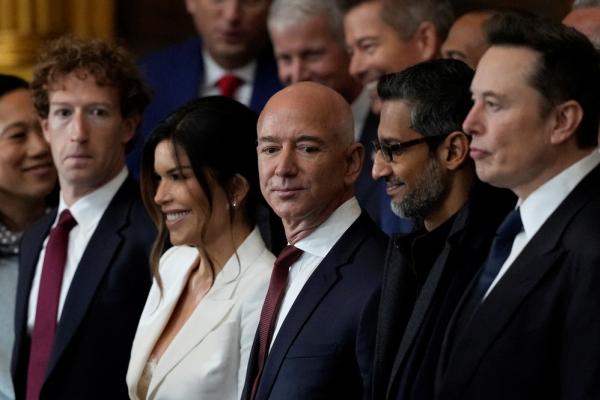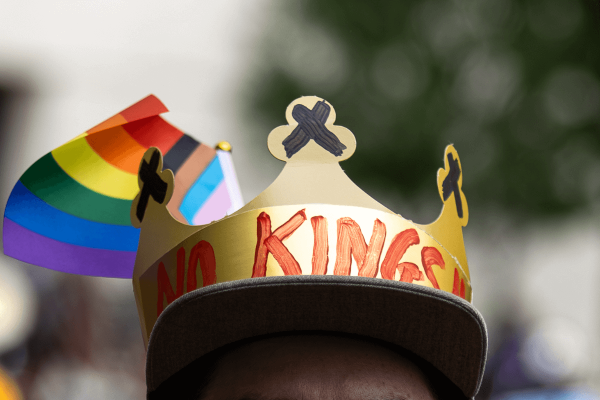Liz Lin is a writer and teacher on issues of race and culture. In 2016, she and Lydia Shiu founded Progressive Asian American Christians, a community of socially, politically, and theologically progressive Asian American and Asian diaspora Christians. The Facebook group currently has over 6,000 members with in-person meetups happening in 20 states across United States and internationally. Lin spoke with Sojourners fellow Joey Chin to discuss her faith journey, the history of PAAC, and how Asian Americans can engage in the work of faith-based social justice.
This interview has been edited for length and clarity.
Joey Chin, Sojourners: Can you tell me a little bit about your faith life and faith background growing up?
Liz Lin, Progressive Asian American Christians: I am the daughter of Taiwanese immigrants who, like many Taiwanese immigrants, are not really religious. My mom was baptized by Catholic missionaries in Taiwan and so her family is nominally Catholic. My dad is Buddhist but went to a Catholic university for college and thought seriously about becoming a priest for a while because for him, all religions were more or less the same. So when they started a family they raised us pretty much agnostic.
Then in eighth grade, my mom had terrible back pain and she tried using Western medicine but it didn’t work. So she started going to this acupuncturist and I went with her to one of her appointments. When he came in to meet my mom, he handed me two tracts. One was a normal Four Spiritual Laws Tract and one was called “48 hours in hell.” It was the story of this British coal miner in the 1800s who died and went to hell and came back to life and became a Christian because of the horrors he saw there. I don’t remember anything in the first track but I remember the second one so vividly because I was terrified. I didn’t want that to happen to me so I was like “how do I avoid that?” I had this Bible from fourth grade, and maybe if I read that God will look favorably upon me and save me from hell. So I started reading the Bible every half hour; like my own little church service which is kind of bonkers because the Bible doesn’t make any sense to an adult let alone a 13-year-old who’s reading it with no guidance at all.
So then as I was holding all of this, a friend invited me to her new church and I was like, "Yes, thank God, somebody help me out here." It was a Taiwanese immigrant church. There was a service for the adults in Mandarin and then there was this high school service in English in this small side room. And I walked in and there were guitars and drums and this super cool Chinese Canadian pastor. That experience of just being welcomed into this space made me feel comfortable sticking around and getting some questions answered. So TLDR is that I grew up non-religious and came to faith through an evangelical Asian American youth group in high school.
Chin: In what ways were the formation of your faith identity and racial and ethnic identity intertwined since they seemed to be formed once you started going to that youth group?
Lin: They’re completely intertwined because that community was my first Asian American community and my first Christian community, so both of those things entered my life at the same time. And the only Christianity that I knew really until I got to seminary was a very distinctly Asian American Christianity and all my Asian friends were Christian and all my Christian friends were Asian. So yeah those two things are inextricable for me.
Chin: Could you tell me about your time in seminary? I know that was a time when you started to deconstruct a lot of your theology and beliefs. What was that like?
Lin: I think I had a pretty standard Asian American Christian high school and college experience. I’d been super involved in this youth group that was very close knit. I went to college, joined the Chinese American chapter of InterVarsity at Michigan, so I fell into a Christian fellowship where the majority of people were exactly like me, second generation children of Taiwanese immigrants, mostly upper-middle class, upwardly mobile, etc. I think I had already started to question my conservative worldview. I started to realize that being a Christian didn’t mean I had to be a Republican. But then, getting to seminary was this completely mind-blowing experience because I was taking theology classes where they were asking questions that I would never have been allowed to ask in my Christian fellowship in college. Like why are there two creation accounts in Genesis? What if Job is fiction? I didn’t have any room for that. I couldn’t believe those questions were allowed. I didn’t know you could read this Bible with this critical lens of "Not all of this has to be literally true to be true." But the people who were teaching me these things and asking these questions had very robust faith, and so that communicates to me that you can ask these critical questions and think critically about your faith and still take it very seriously.
Chin: Did you ever feel like you were losing a part of you identity as an Asian American as you were deconstructing your thoughts because the faith identity and racial identity were so intertwined?
Lin: I went to Fuller Theological Seminary so there’s a sizable Asian American population and there were a number of other Asian American women in my program who I was close with. So I think because I had them to process with and to experience this with, that’s what made me feel I didn’t lose this piece of my Asian American identity. If I had been the only one I could see how this process would have felt like this current breaking me away from my Asian American community. But going to Asian American churches became next to impossible because I cared a lot about things like justice and I had a lot of questions about the Bible and … I don’t think those Asian Americans were openly rejecting these things but they were not talking about these things. It did drive this wedge between me and the wider Asian American community, but I didn’t feel like I personally had to give up that piece because I had other people — other Asian Americans — in the program with me.
Chin: You mentioned a lot of people were not necessarily opposed to different or new ways of thinking or more progressive theology, but it wasn’t something that people really talked about. And I think that’s something that really resonates with me. I was also involved with an Asian American InterVarsity chapter in Seattle and the two other East Asians at Sojourners were both involved with ethnic-specific ministries at InterVarsity as well.
Lin: It’s such a common thread in the Asian American Christian experience. The first Bay Area PAAC meetup, almost everyone had been involved in InterVarsity. And so I don’t know, I think that speaks somewhat to InterVarsity’s effectiveness at reaching Asian American populations. I think it also speaks somewhat to how easy it is to fit an Asian American Christianity into a white evangelical context. I think that Asian American evangelicalism is, in some ways, a lot like white evangelicalism just different faces — same resources, same theologians, etc. It’s not a big jump from white evangelicalism. What was your experience?
Chin: You wrote a piece — I think it was on coming to terms with your racial identity — and there was a stage in there on immersion. InterVarsity for me was where I think I was at the immersion stage — I think I skipped whatever the second stage is where you’re curious. I think I wasn’t really curious about exploring my ethnic identity. But I have very fond memories of being in InterVarsity and really feeling at home with other Asian Americans and so that was a very formative first year for me. And InterVarsity is also where I started to think about the intersection of faith and social justice. Particularly the staff in the Pacific Northwest were big on that.
Lin: I resonate with what you said about this being your first exposure to the intersection of faith and social justice and maybe we should act in certain ways towards justice because of our faith. Because InterVarsity was my first exposure to racial reconciliation, which is now not the term to use, but was in the early 2000s. It’s so interesting to me how InterVarsity is responsible for setting me on this path toward caring deeply about justice because of my Christian identity, while at the same time most people in my chapter did not care to talk about these things. InterVarsity did such a good job at forming so many people around issues of race, but then when it came to sexuality, it was like, remember all those things we told you about understanding race in terms of context and nuance? Turn all of that off, and do not apply that when it comes to sexuality. So that was very disappointing for me and I think for a lot of other alums as well.
Chin: How do you think we can deconstruct what we know in a way that’s productive and follow our questions when it might be scary to do so?
Lin: When we started questioning the Bible, everything falls apart. What can we even trust or believe in? But I think the second fear is that it will drive a wedge between us and this community that is really important to us especially as Asian Americans because we’re a super community-oriented culture. So I think that a lot of Asian American Christians are afraid to do that and for legitimate reasons. Those fears are not unwarranted. I have a lot of empathy for people who want to ask questions but are worried about the cost because the cost is real. I think one thing that was really helpful for me was just to look for as many alternatives as you can in terms of what Asian American Christianity can look like. Or what Christianity can look like. I would encourage exploration and reading a lot and looking for other examples of people who take their faith seriously but whose faith does not look the same as yours. And I say that because that was such a crucial part of the process for me.
Chin: So we’ve been talking about what it means to be a Christian and our conceptions of Christianity but, in the name progressive Asian American Christians, all of those terms mean different things to different people. What have been some of the challenges and opportunities that have come from having these conversations around how people define these terms?
Lin: I think the toughest challenge we’ve had as a group is trying to thread this needle of how progressive means different things to different people, and it’s inherently a relative term. So what is progressive in some communities is not even remotely progressive in other communities. You have people that are at all steps of their journey and creating a space that is for all of them is tough because you want to have this space where progressive, self-identified progressives, feel comfortable and safe talking about their stuff — especially folks who are queer and have been burned by the church on all sides and had their humanity questioned by the church. And at the same time, we also want people who aren’t as far along in their journey to be able to listen and learn from these conversations and ask questions. But it’s often difficult to have both those things at the same time. And at the beginning, Lydia and I thought we could do both and prioritize them equally. But as the months wore on, it became clear that we could not prioritize those equally. We could not have queer people in our group and also allow discussions on whether or not the Bible says homosexuality is a sin. Because those discussions are violent to the queer people in the group who have to deal with that question in every other Christian space they’re in.
That said, we are also trying [to figure out if] there ways we can make it easier for people to ask questions. How do we do better to accommodate people who are not as far along on this journey?
Chin: So PAAC is almost three years old. Looking back at everything that’s happened, what are you most thankful for and what are some of your hopes and goals for the group going forward?
Lin: What I am most thankful for is that I really feel like PAAC has become a community. And that word is super cliché, but I didn’t really expect anything to happen. I just thought people would join and see other profile pictures of people that identify with this and see there’s a group of people like them. I had no idea that Facebook groups were a thing and culture. So the fact that people know that they’re not alone … everything beyond that has been gravy. That is all I wanted from any of this. So the fact that people are finding real belonging and relationship and this real sense of they aren’t alone, that is just so beautiful to me. And especially for the queer people in our PAAC family, there’s a subgroup for queer and questioning folks — I think that is the single most important ministry we have. People who are queer and Asian American and Christian can know that they’re not alone there’s people like them there so deeply loved.
What are my hopes and dreams going forward? I want this to be a thing that lasts.
Got something to say about what you're reading? We value your feedback!
